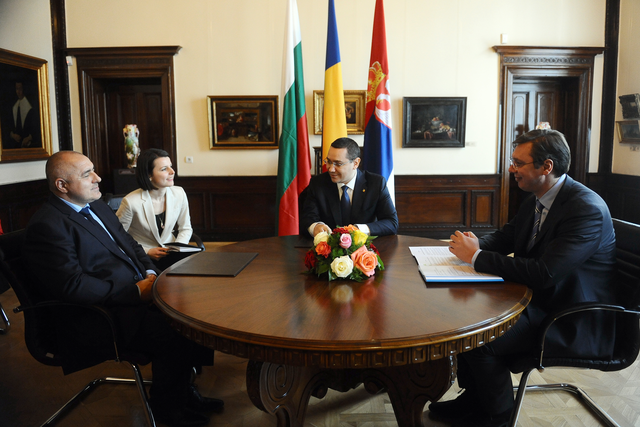The Danube and regional cooperation
The prime ministers of Romania, Bulgaria and Serbia met in southern Romania to find new ways of boosting cooperation.

Bogdan Matei, 27.04.2015, 13:20
Thanks to their internal stability and their consistency in carrying out comprehensive reforms, Romania and Bulgaria were accepted into NATO in 2004 and the European Union in 2007. Today only an EU candidate state, their Balkan neighbour Serbia in still convalescing after the devastating conflicts of the 1990s that led to the break-up of the former Yugoslavia.
On Friday in Craiova, in southern Romania, close to the borders with Bulgaria and Serbia, Romania’s prime minister Victor Ponta proposed his Bulgarian and Serbian counterparts, Boyko Borissov and Aleksandar Vucic, respectively, to initiate concerted action on the model of the Visegrad Group, an alliance of central European states.
The three Danube states of Bulgaria, Serbia and Romania “must take more coordinated and more unitary action in Europe”, said prime minister Victor Ponta. “We have the successful example of our neighbours, Poland, the Czech Republic, Slovakia and Hungary, who, by means of the Visegrad Group, have been able to exploit their regional interests efficiently,” said the prime minister, arguing in favour of the creation of a Craiova Group. He also believes Bulgaria and Romania can better defend their interests in Brussels if they work together. Having joined the European and Euro-Atlantic structures at the same time, the two states now also have the chance to walk into the Schengen area together if they cooperate, said Victor Ponta, a view shared by his Bulgarian counterpart. Apart from joint projects in the fields of energy and infrastructure, cooperation must be expanded to other areas, including the fight against smuggling and human trafficking, said Bojko Borissov.
During their talks with Serbia’s prime minister, Ponta and Borissov emphasised the common strategic and economic interests of the three states, from the situation in the Western Balkans to the Danube region strategy. They reiterated their “full and unconditional support for Serbia’s efforts to become a member of the European Union”.
Commentators say the three-party talks in Craiova were also a coordinated attempt from Romania and Bulgaria to set Serbia even firmer on its European course. Playing the card of its equidistance from Brussels and Moscow and aspiring to European integration while maintaining privileged ties with Russia, Serbia has often given contradictory signals.
For Romania, Serbia’s commitment to western values is all the more important as the border regions of Vojvodina and Timoc are home to significant Romanian ethnic communities. Romania is one of the five European Union members states still to recognise the independence of the former Serb province of Kosovo with a majority Albanian population, but has always called on Belgrade to comply with European standards with regard to the treatment of ethnic minorities.






























